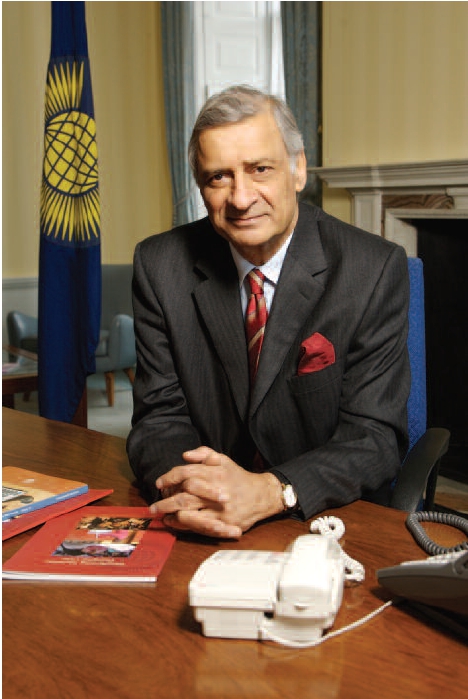Good health is fundamental to the welfare of our citizens and to their personal sense of well-being. As such, it is clearly of overriding importance for its own sake. It is also the foundation on which fulfilling lives can be built that enable individuals to contribute to the social cohesion and economic prosperity of their communities. This holds true for citizens of all Commonwealth member states, irrespective of national stages of development, and has consequences for resilience and progressive sustainability – key concerns for the Commonwealth collectively.

Kamalesh Sharma, Commonwealth Secretary-General
Health systems throughout the Commonwealth have to contend with the challenges of non-communicable diseases (NCDs) such as cancer, heart disease, diabetes and chronic lung disease. Many also have to address high and widespread incidence of communicable diseases (CDs) such as HIV/AIDS, malaria and tuberculosis.
As awareness grows of the interplay and interrelation between NCDs and CDs – this dual burden faced by health systems – it is timely that the theme for this year’s Commonwealth Health Ministers Meeting should be the link between the two.
Commonwealth Health Partnerships 2012 gives examples of how, as countries seek to find ways of addressing the growing NCD challenge, imaginative efforts are being made in different parts of the Commonwealth to draw on existing knowledge of how CDs have been effectively tackled. There are, for instance, many lessons to be learned from national and global initiatives that have helped to save or prolong many lives that would have been otherwise lost or foreshortened as a result of the AIDS epidemic.
The concerted efforts that have led to the eradication of polio in most of the world also offer examples that can be built upon as we strive to find ways of responding to NCDs, often in the context of health systems that are overstretched and short of resources.
Inadequate infrastructure, financing and human resources for health all conspire to limit our ability to respond. The dual burden of NCDs and CDs requires not only a response from the health sector but also action across all sectors in order to ensure and strengthen overall social and economic development and resilience.
Through our Health Section, the Commonwealth Secretariat has sought to assist member states with strengthening health systems through a variety of programmes and activities. These include bringing countries together to learn from each other in developing and reviewing e-Health policies and strategies, which are essential contemporary tools for improving the quality of, and access to, health care.
As part of the Commonwealth Secretariat Road Map on NCDs, adopted by Commonwealth Health Ministers in 2010, the Secretariat offered media training to journalists in the Caribbean, many of them young, raising awareness and sensitising media professionals to NCDs and related key issues. Our Commonwealth understanding is that this interdisciplinary approach advances coherence, progress and the spread of knowledge. It is particularly appropriate to bear this in mind in a year when our Commonwealth theme, ‘Connecting Cultures’, reminds us of the importance of creating linkages across professions – as well as across geographical boundaries.
Many of the journalists who participated in our media training workshop continue to report on NCDs in the Caribbean. The Secretariat’s advocacy film on young people and NCDs has also been disseminated widely – for example, it was shown at a large-scale music event in Barbados and distributed throughout the Caribbean media networks.
In preparation for next year’s Commonwealth Health Ministers Meeting, the theme of which will be mental health, the Secretariat will be commissioning a related study. In addition, a paper in this publication examines how the delivery of mental health services can be leveraged to respond to other NCDs and the overall disease burden in the Commonwealth.
The Secretariat is planning to further assist member countries by facilitating regional dialogues and experience sharing on the social and cultural challenges of addressing health priorities in the Commonwealth; by facilitating the process of harmonisation, resource mobilisation and implementation of NCD Action Plans in West Africa; by working with nursing and midwifery leadership teams from 14 countries to improve professional regulation in East, Central and Southern Africa; and by assisting Commonwealth countries in South East Asia to review progress and share experiences on the scaling up of prevention of mother–to-child transmission (PMTCT) of HIV and the integration of PMTCT into maternal and child health services.
These examples of our work alongside communities with some of the lowest levels of access to health care globally demonstrate the practical value of Commonwealth Health Ministers Meetings in changing the lives of Commonwealth citizens. There can be few areas of endeavour that are of greater importance than improving the health of the poor, the marginalised and the vulnerable. By convening to find ways of working together on this great global good, our Health Ministers remind us of the deep sense of shared humanity and purpose that lies at the heart of our Commonwealth.
